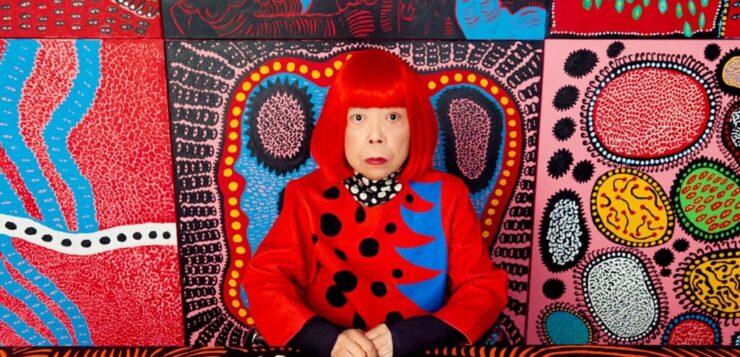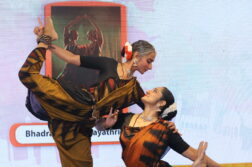Pain, Fear and Hallucination that Pulsated her Creation
“I fight pain, anxiety, and fear every day, and the only method I have found that relieved my illness is to keep creating art. I followed the thread of art and somehow discovered a path that would allow me to live.”
Yayoi Kusama, the Japanese genius who has kept the art firmament of the world lit up for now over seven decades, lives in a mental asylum in Tokyo since 1977, by choice. And she is still creative and productive. Pain for her is the reason for her survival!
If she is outrageously controversial, she is daringly different; if she is unorthodox and loves to challenge the conventional and the commonplace, she also leaves an indelible imprint of a genius, if she challenges sanity and order, she impersonates them in her own life- openly, un-pretended and un-disguised.
She is Yayoi Kusama, a woman who could outmatch any human in style, substance and success!
An Unusual genius
Few men or women, in recent times, who straddled the world of arts, have courted such controversy and invited such diverse attention as this Japanese contemporary artist. She began as a sculptor and an installation artist but conquered with panache and distinction fields as diverse as painting, performance, video art, fashion; even poetry and fiction.
She has experimented so extensively and successfully, and her works span such variety and range, that even while still alive, she has acquired a cult status. If there are ardent admirers of her art, there are as many trenchant critics; vociferous voices that deride her accomplishments and find her works of art too gross for appreciation. But all of them ungrudgingly grant her a rare talent expressed with extraordinary originality and fearless innovation.
A Defiant Feminism
Yayoi Kusama is perhaps the best and the finest contemporary symbol of a woman’s creativity standing out on pure merit and an uncommon daring of conviction undiminished and unaffected by the ambient male challenge. Her life and her oeuvre eminently establish a woman’s will, capability and determination to create a world fashioned by her impulses, intentions and innovations.
She is known to have displayed elements of feminism, minimalism, surrealism, Art Brut, Pop Art and Abstract Expressionism, a range impossible to find in one artist’s rapporteur. Her creations reflect autobiographical and psychological content and a sexualism that undergirds her exceptional creativity.
A scarred Childhood
Born in 1929 in Matsumoto, Japan and trained at the Kyoto School of Painting, Kusama’s troubled childhood and the hallucinations that visited her then and through most of her life, seem to be both the inspiration and reason for her art. Her life’s early experiences framed by a philanderer father and a jealous insecure mother, made her hate the usual ideas of pleasure and joy. Her own understanding of the women’s position in Japanese families and societies made her a rebel. Never apologetic, she flaunted her open disgust and ridicule of the prevailing tenets of propriety and sexuality.
The other source of her inspiration was her hallucinations, mostly of soft, soothing swathes of light descending around her, both divine and surreal. That she chose themes explicit with sexual connotations, defying the moral milieu by making nudity a central piece of her artwork, explains to some extent her tortured and rebellious mind.
Polka Dots
Kusama’s identity is distinctively the depiction of polka dots. In her most shocking exhibition, she made nudes wear only polka dots. ‘A polka-dot has the form of the sun, which is a symbol of the energy of the whole world and our living life, and also the form of the moon, which is calm. Round, soft, colourful, senseless and unknowing. Polka-dots become movement … Polka dots are a way to infinity.’, she reportedly explained her obsession with polka dots with this justification.
And in pursuance of her conviction, she could go to any length. Her crusade for ending Vietnam War compelled her to write an open letter in 1968 to the then American president, Richard Nixon, “let’s forget ourselves, dearest Richard, and become one with the absolute, all together in the altogether.”Many construed this letter as an invitation to Nixon to sleep with her.
Japan, New York, and Japan
Kusama’s creative life saw three distinct phases. She began as a painter of the Nihonga style, a traditional Japanese style of painting but found it unappetising and moved on to New York and through 60s and later, became a part of New York’s avant-garde scene largely inspired by Abstract Impressionism. It was here that she came into contact with Donald Judd, Eva Hesse Georgia O’Keefe and Joseph Cornell, the latter of who was 26 years elder, in a passionate but platonic affair that continued till Cornell’s death in 1972.
Passionately embracing the then-popular Hippie culture and Pop Art, she caught public notice and even notoriety when she organised a series of happenings in which naked participants were painted with brightly coloured polka dots. In 70s and later she created art mostly by installations in various museums around the world.
In 1973 she returned to Japan and continued with her artwork. Later announcing to be in an abnormal mental state, she began dabbling in literature and produced poems and fiction of noticeable quality. Her forays in the arena of films and fashion too left a distinct impression and further evidence of her uncommon versatility.
Inspired Installations
Her installations including in Central Park, New York, Venice Biennale and Singapore Biennale and her Infinity installations at numerous venues, established her as an artist with uninhibited genius and extraordinary originality. She is best remembered for these installations, grand in scale, often shocking in theme, and always displaying an element of surrealism. Light, spheres, dots, space, and sky, even painted pumpkins mingled, merged and metamorphosed into brightly coloured patterns that never failed to attract and sustain attention and approbation. The millions of footfalls of visitors and the riveting spell cast on them ensured her an uncommon standing and ovation, and placed her in an enormously enviable position, a dream desperately coveted by every artist.
Living Immortality
Since 1977, and to date, Kusama has been living permanently in a mental hospital, by choice. Her studio, where she has continued to produce work since the mid-1970s, is a short distance from the hospital in Tokyo.
Kusama is often quoted as saying: “If it were not for art, I would have killed myself a long time ago.”
Kusama is remarkable by any measurement of human ingenuity, talent, enterprise and achievement. She will be remembered by posterity not because she was a great artiste-prolific, versatile and original, which she indeed was- but because of the strength of her character, conviction and commitment to ideals that she ardently and fervently espoused and lived to personify. To remain in a mental asylum, in voluntary self-exile, betrays an extraordinarily strong determination and defiance trapped in a frail and delicate feminine frame. Hers is a spirit that steam-rolls a male-dominated value system and rules set to their advantage.
At 93, alive and active, her defiance of mortality remains as compelling, as convincing.
Another gem from the pen of Uday Varma, Former I&B secretary, writing exclusively for us, on women in history overlooked by omission or distortion!
This article is part of a series on women through history by author Uday Kumar Varma, former secretary of the Ministry of Information & broadcasting and MSME, Government of India. An ardent proponent of gender equity, Varma writes on women through history who have excelled in their area of passion and defied conventions. You may also like to read about the woman who triggered the abolishment of slavery, Harriet Beecher Stowe, activist Emmeline Pankhurst from England, the lady sniper Lyudmila Pavlichenko from Russia, the American pilot Amelia Earhart or Judge Ruth Bader Ginsberg or just maybe a piece on the Spanish artist Frida Kahloor Artemisia from Italy? And you must read the story of Mata Hari from the Netherlands– “Harlot? Oui! Mais traitoress, jamais!” ‘Courtesan! Yes; Spy, never!’
Or maybe the painter Okeefe ?





